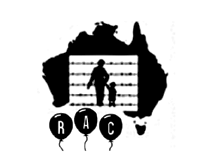This speech was delivered by Dr Michael Dudley, Co-Chairperson, Suicide Prevention Australia, to the rally outside Tanya Plibersek’s office a few weeks ago
With acknowledgements to Dr Fran Gale
Thanks for the invitation to speak.
I have been OS for about a month till last week. Consequently I can’t claim to be fully up to speed, and what I say will be brief. However nothing much seems to have changed. The policies of deterrence continue, captive to party politics.
The Pacific Solution is in full swing again, under a different party’s banner of course, but with the same old places (Nauru, Manus). In the wake of the somewhat obscure, cognitively challenging policy of ‘no advantage’, we have organised misery for those in these locations, by suspending them indefinitely and with a gross deficiency of ordinary goods, services and protections.
Though the collective focus has shifted offshore, the bane of onshore immigration detention also continues. Many are released into the community, but many others are still indefinitely trapped. Hunger-strikes and self-harm continue, taking people to the very edge of life, because they feel that they have no other voice.
For those released, the myth that they are living in five-star hotels seems to persist, and therefore various parties want to make the conditions as Spartan as possible. From the Opposition, we hear talk of the resumption of temporary protection visas, and the reduction of the recently extended quota. (Compare this with the numbers of refugees in some European industrialised countries). We are currently re-visiting the unseemly debate about whether these people should be allowed to work – as though there should ever have been a question about this fundamental human right.
We seem still to be unable to appreciate how refugees enrich us – how they have contributed enormously to Australian culture and life: instead we build false security by excluding and disowning the stranger (and thus become strangers to ourselves). There is little appetite for genuine exploration of real solutions from either main political party. What for example would an onshore model for responding to refugees cost? – say redirecting our misspent monies to properly worked out regional agreements with our neighbours, a properly resourced and supported UNHCR determination process, and air-lifting asylum-seekers to Australia, as Malcolm Fraser once did? Parliament and people know plenty now about the mental health impacts, but who cares?
If we can’t care about the mental health of asylum-seekers, and the nightmare that Australia creates for them, could we be induced to care about the mental health of Australians? Could excluding and creating an underclass of asylum-seekers affect our mental health – with the possibility that their nightmare may become ours?
We know a lot about the social factors that underpin mental disorders – such as war, gender-based violence, abuse, poverty, racism, social inequality: and we also know a lot about the social factors that promote mental health – such as the rule of law, basic conditions of life being met, social connectedness, education, a reasonable standard of income, spirituality etc. Governments Fed and state are highly preoccupied at present with approaches to strengthening communities.
All kinds of studies indicate that strong and connected communities with trust and cooperation across traditional divisions of ethnicity, religion, class and gender are more resilient and more effective at enhancing mental health than more homogeneous environments, while primarily competitive self-interested approaches tend to isolate people.
There is also concern about societies that manifest increasing social inequality and the impact of this on the wellbeing of everyone. It seems that we need to wake up to what is really happening here … that the kind of society we are creating by such policies. The overall effects of such measures are to increase isolation, stigma and a personal sense of burden, poverty, disability, and inequality. They do not provide us with a strong and connected community, and therefore are not in the interests of the mental health of Australians.
So we must therefore ask ourselves:
Do we want a more equal society, where all people can participate?
Do we want a rich diverse community?
Do we want a significant group of our future citizens (like those who will be joining us from Nauru) to be an underclass who are denied a productive life?
Do we want a higher quality national debate on seeking asylum?
Our mental health and well being depend on each other. To misquote W.H.Auden, ‘we were mistaken. These faces are ours’. We cannot stand aside from what is happening: we have to stand and be counted. We not only diminish ourselves, but jeopardise our own interests, if we allow these policies toward refugees to continue, and allow the two major parties to continue to head-butt each other when there is clearly another way forward. Let us continue to press this point until the penny drops, and until sanity prevails.

